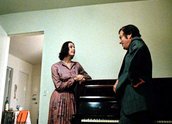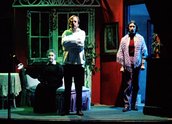


Lonely Hearts (1981)
Synopsis
After his mother dies, Peter (Norman Kaye), a piano tuner, meets Patricia (Wendy Hughes), a shy bank clerk, through a dating agency. He’s approaching 50 and wears a wig, she’s in her 30s and afraid of sex. Their friendship blossoms during rehearsals for an amateur theatre production, but falters when Peter’s desire becomes too urgent.
Curator’s notes
Lonely Hearts helped to establish Paul Cox’s international reputation as an Australian 'auteur’, and one of the freshest talents of his generation. It’s partly a dramatisation of the loneliness he felt as a new migrant, when he arrived from Holland in 1965, and partly a dark comedy about families.
Both characters have interfering siblings or parents, and that is part of their bond. Both have put their own lives on hold for a long time, because of responsibility to parents. The death of Peter’s mother removes any obstacle to him looking for love, but he fears it may be too late. Patricia has only just moved out from her parents’ home, but her fear of intimacy is so strong that she’s seeing a psychiatrist.
One of the film’s defining characteristics – and a feature of all of Paul Cox’s best work – is the sense of compassion he brings to his often broken and loveless characters. This becomes darker in later films, but Lonely Hearts is full of bright and impish comedy, partly because it was co-written by the comedian and satirist John Clarke. The theatre scenes in particular, bear his mark. Norman Kaye and Wendy Hughes are superb in the film. It’s amongst the best work that each has done, as it is for director Paul Cox.
Lonely Hearts was released in Australian cinemas on 21 October 1982. It was nominated for five AFI Awards in 1982 and won one – Best Film.
- Overview
- Curator’s notes
- Video 3 clips

- Principal credits
- Find a copy
- Make a comment
- Add your review



